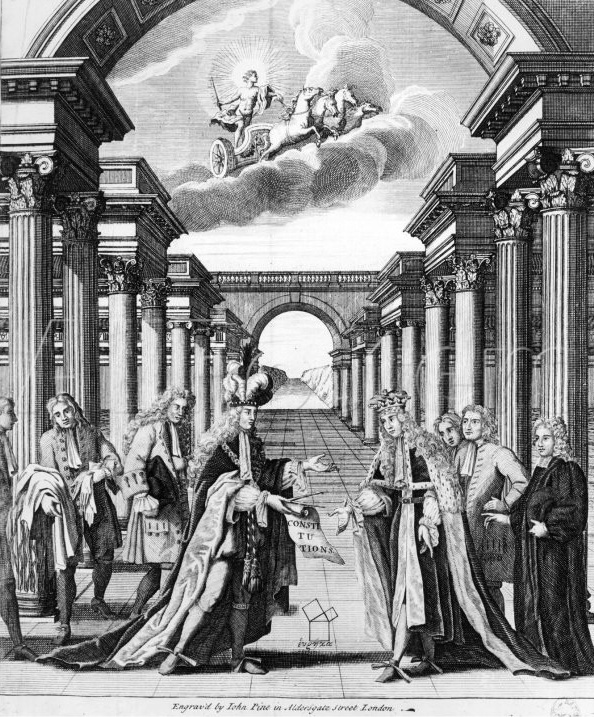Any Freemason that has taken a moment to delve into the history of Freemasonry, has undoubtedly discovered a legendary history of the order. Typically these histories will include an account of the fraternity as carried down from Adam through the building of King Solomon’s Temple and practiced by Pythagoras. For many Freemasons, these histories are confusing. While they are very grand and interesting, they leave much to be desired by the inquiring mind. Today, we will examine where these legends came from, discuss their purpose, and hopefully shed some light on these epic Masonic histories.
The first known account of Masonic history that included prominent characters from the Bible and the classic periods was included in Anderson’s Constitutions of the Free-Masons. This particular history is very elaborate and includes the great influence of Masonry throughout the existence of man, including its effect on the history of England. Anderson’s Constitutions does not explain whence this account originated nor does it reference any documents which can provide additional information. It is a speculative account of Freemasonry’s origins, which was developed to imply the greater grandeur of the noble order.
The practice of creating these histories was not uncommon during the period that Anderson composed the Constitutions. A quick investigation of the Independent Order of Odd Fellows will show that this organization also provides a speculative history. Some trace that particular order back to the exile of the Israelites in Babylon.2,3 These elaborate histories are intended to provide a sense of pride in the fraternity by appealing to one’s religious and geographical identity. Not surprisingly, the founders of modern Freemasonry in England included characters from the Old Testament and British royalty in their history to appeal to their member’s religious beliefs and patriotism. Perhaps the fact that the Freemasons had one of the most detailed and awe-inspiring historical accounts contributed to their unmatched success as a fraternal order.
Despite the fact that this historical account seems obviously fabricated to create a greater reverence for Masonry, many Masonic scholars have expanded upon these legends. These elaborations are probably the primary reason that some Freemasons are quite convinced that these legends are true. Albert G. Mackey, Albert Pike, and Manly P. Hall are among those that embellish the first Masonic epic from the Constitutions of 1723. These accounts include a detailed history of how Masonry was established and passed among the Hebrews, the union of chivalric orders such as the Knights Templar with Freemasonry, and the effects of the mystic traditions on the fraternity. Whether these scholars intended for their histories to be viewed as legendary or factual is unknown. What is known is that these accounts are completely lacking in any historical basis and like the history provided by Anderson, was probably intended to provide a sense of purpose for the order.
What we do know about the origins of Freemasonry is that the first Grand Lodge was formed in the early 18th Century by a few speculative lodges that had been operating independently for some time. We may never know the true history of our speculative art, but we can take pride in the organization that it has become. Additionally, our speculative history does serve as the basis for many of our beautiful degrees. It is entertaining and rich in symbolism. It is a part of who we are as a fraternity and as long as we recognize the Masonic legend for its ritualistic significance and not as factual evidence of our longevity, it will continue to serve our noble order well.


I believe this article is not complete in a sense that freemasonry existed in Scotland long before thew early 18th century. The first grand lodges, if my informatation is correct, go back to Scotland in 1583. What exactly ios the reason that London continues pretending that they are the first grand lodge ever?
I will agree that lodges did exist in Scotland in the century prior to England’s 1717 Grand Lodge. I am currently unaware of any Scottish Grand Lodge that pre-dates that of England’s, but I have a feeling that will be my next topic of Masonic research. However, that is the actual history of Freemasonry, not the legendary history which was the topic of this particular article.